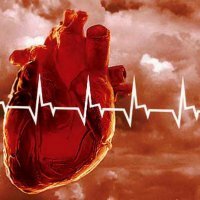Bradicardia: sintomas e tratamento
 In an adult, the normal heart rate is between 65 and 80 beats per minute.Reduction of heart beat less than 60 beats per minute is called bradycardia.There are many reasons leading to bradycardia, which a person can only determine by a doctor.
In an adult, the normal heart rate is between 65 and 80 beats per minute.Reduction of heart beat less than 60 beats per minute is called bradycardia.There are many reasons leading to bradycardia, which a person can only determine by a doctor.
Regulation of heart activity
In physiology, the notion of heart automatons is distinguished.This means that the heart contracts under the influence of impulses that arise directly in itself, primarily in the sinus node.These are special neuromuscular fibers located at the site of the confluence of the vena cava into the right atrium.The sinus node produces a bioelectric pulse that propagates further along the atria and reaches the atrioventricular node.So the heart muscle contracts.The excitability and conductivity of the myocardium is also influenced by neurohumoral factors.
Bradycardia can develop in two cases.First of all, the reduction in activity of the sinus node results in a decrease in heartbeat when it generates few electrical impulses.Such a bradycardia is called the
sinus .And there is such a situation when the sinus node is functioning normally, but the electrical impulse can not pass fully along the conducting paths and the heartbeat is cut. 
Causes of physiological bradycardia
Bradycardia is not always a sign of pathology, it can be physiological .Thus, athletes often have a small heart rate.This is the result of constant stresses on the heart with prolonged training.How to understand is bradycardia the norm or a pathology?A person needs to perform active physical exercises.In healthy people, physical activity leads to an intense increase in heart rate.If the excitability and conduction of the heart are disturbed, the exercise is accompanied by a slight increase in heart rate.
In addition, the heartbeat is also reduced by hypothermia.This compensatory mechanism, due to which the blood circulation is slowed down and blood is directed from the skin to the internal organs.
The nervous system affects the activity of the sinus node.Parasympathetic nervous system reduces palpitation, sympathetic - increases.Thus, stimulation of the parasympathetic nervous system leads to a decrease in cardiac contractions.This is a well-known medical phenomenon, which, by the way, many people face in life.Thus, with pressure on the eyes, the vagus nerve( the main nerve of the parasympathetic nervous system) is stimulated.As a result, the heartbeat is shortened for eight to ten beats per minute.The same effect can be achieved by pressing on the area of the carotid sinus on the neck.Stimulation of the carotid sinus can occur when wearing a tight collar, tie.
Causes of pathological bradycardia
Bradycardia can develop under the influence of a wide variety of factors. The most common causes of pathological bradycardia are:
- Increased parasympathetic system tone;
- Heart Disease;
- Hypothyroidism;
- Admission of certain medications( cardiac glycosides, as well as beta-blockers, calcium channel blockers);
- Poisoning( FOS, lead, nicotine).
Increased parasympathetic tone
Parasympathetic innervation of the myocardium is due to the vagus nerve.When it is activated, the heart beat is reduced.There are pathological conditions, in which there is an irritation of the vagus nerve( its fibers located in internal organs, or nuclei of nerves in the brain).

Increased parasympathetic nervous system tone is observed in such diseases:
- Increase in intracranial pressure( in the background of craniocerebral trauma, hemorrhagic stroke, brain edema);
- Peptic ulcer;
- Neoplasms in the mediastinum;
- Neurocirculatory dystonia;
- Condition after surgery in the head area, as well as the neck, mediastinum.
As soon as the factor stimulating the parasympathetic nervous system is eliminated, the heartbeat will be normalized.This type of bradycardia physicians define as neurogenic.
Heart Disease
Heart diseases( cardiosclerosis, myocardial infarction, myocarditis) lead to the development of certain changes in the myocardium.In this case, the pulse from the sinus node passes much more slowly in the pathologically altered portion of the conducting system, which causes the palpitation to contract.
When the impairment of the electrical impulse is localized in the atrioventricular node, they talk about the development of atrioventricular blockade( AV blockade).

Symptoms of bradycardia
Moderate reduction in the heart rate does not affect the condition of a person, he feels well and is engaged in the usual affairs.But with further decrease in heart rate, blood circulation is disturbed.The organs in insufficient volume are supplied with blood and suffer from a lack of oxygen.Especially sensitive to hypoxia is the brain.Therefore, with bradycardia, the symptoms from the side of the nervous system defeat come to the fore.
In bouts of bradycardia, a person experiences dizziness, weakness.Pre-fainting conditions and syncope are also characteristic.The skin is pale.Often, shortness of breath develops, usually on a background of physical activity.
At a heart rate of less than 40 beats per minute, blood circulation is significantly impaired.With delayed blood flow, the myocardium does not receive oxygen to the proper extent.As a result, there are chest pains.This is a kind of heart signal that he does not have enough oxygen.
Diagnostics
 In order to identify the cause of the bradycardia, it is necessary to undergo a survey.First of all, you should go through electrocardiography.This method is based on the study of the passage of a bioelectric pulse in the heart.So, with sinus bradycardia( when the sinus node rarely generates an impulse), there is a decrease in heart rate while maintaining a normal sinus rhythm.
In order to identify the cause of the bradycardia, it is necessary to undergo a survey.First of all, you should go through electrocardiography.This method is based on the study of the passage of a bioelectric pulse in the heart.So, with sinus bradycardia( when the sinus node rarely generates an impulse), there is a decrease in heart rate while maintaining a normal sinus rhythm.
The appearance of such signs on the electrocardiogram as an increase in the duration of the P-Q interval, as well as deformation of the QRS ventricular complex, its loss from the rhythm, a greater number of atrial contractions than the number of QRS complexes will indicate the presence of AV blockade in humans.
If the bradycardia is observed intermittently, and in the form of attacks - daily monitoring of the ECG is indicated.This will provide data on the functioning of the heart in twenty-four hours.
To clarify the diagnosis, finding the cause of bradycardia, the physician may order the patient to undergo the following examinations:
- Echocardiography;
- Clinical and biochemical blood tests;
- Determination of thyroid hormone levels in the blood;
- Analysis for toxins.
Treatment of bradycardia
Physiological bradycardia does not require any treatment, as does a bradycardia that does not affect the general state of health.To therapy of pathological bradycardia proceed after finding out the cause.The principle of treatment is to act on the root cause, against which the heart rate is normalized.
Medical therapy consists in the appointment of medications that increase heart rate. These are medications such as:
- Izadrin;
- Atropine;
- Isoprenaline;
- Eufilin.
The use of these drugs has its own characteristics, and therefore they can be prescribed only by a doctor.
In the event of hemodynamic disorders( weakness, rapid fatigue, dizziness), the doctor can assign to the patient toning up medicines: tincture of ginseng, eleutherococcus, caffeine.These drugs accelerate heart rate and increase blood pressure.

When a severe bradycardia is registered in a person and heart failure develops against this background, implantation in the heart of a pacemaker is used.This device automatically generates electrical impulses.A stable preset heart rate favors the restoration of adequate hemodynamics.
Grigorova Valeria, medical reviewer



